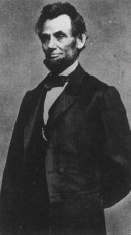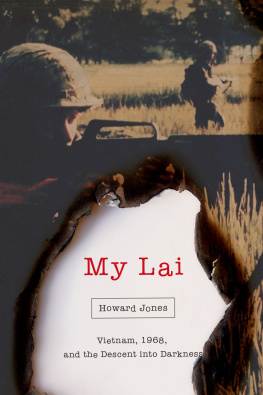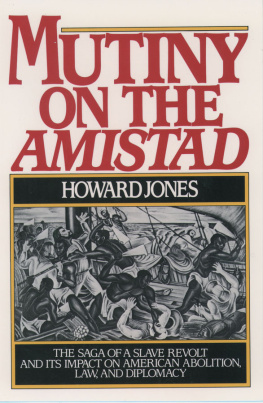Union in Peril
This book was published with assistance from the H. Eugene and Lillian Youngs Lehman Fund of the University of North Carolina Press.
1992 The University of North Carolina Press
All rights reserved
Manufactured in the United States of America The paper in this book meets the guidelines for permanence and durability of the Committee on Production Guidelines for Book Longevity of the Council on Library Resources.
96 95 94 93 92 54321
Library of Congress Cataloging-in-Publication Data
Jones, Howard, 1940
Union in peril: the crisis over British intervention in the Civil War / by Howard Jones,
p. cm.
Includes bibliographical references and index.
ISBN 0-8078-2048-2 (alk. paper)
1. United StatesForeign relations1861- 1865. 2. Confederate States of AmericaForeign relations. 3. United StatesForeign relations Great Britain. 4. Great BritainForeign relations United States. I. Title.
E469.J57 1992
327.73041dc2o 92-536i9
CIP
THIS BOOK WAS DIGITALLY PRINTED.
FOR HOWIE AND TIMOTHY
CONTENTS
ILLUSTRATIONS
Abraham Lincoln, president of the United States
William H. Seward, U.S. secretary of state
Lord Lyons, British minister to the United States
Washingtons diplomatic corps
Lord Palmerston, British prime minister
Lord John Russell, British foreign secretary
Jefferson Davis, president of the Confederacy
William H. Russell, Times of London correspondent in the United States
Naughty Jonathan, London Punch, July 6, 1861
Charles Francis Adams, Union minister to England
James Mason, Confederate minister to England
John Slidell, Confederate minister to France
Judah R Benjamin, Confederate secretary of state
William E. Gladstone, British chancellor of the exchequer
Not up to Time, London Punch, Sept. 13, 1862
Abe Lincolns Last Card; or, Rouge-et-Noir, London Punch, Oct. 18, 1862
George Cornewall Lewis, British secretary for war
Napoleon III, emperor of France
One Head Better Than Two, London Punch, Nov. 22, 1862
Scene from the American Tempest, London Punch, Jan. 24, 1863
Very Probable, London Punch, Aug. 27, 1864
The Last Suggestion from Richmond, Frank Leslies Illustrated Newspaper, Jan. 28, 1865
ACKNOWLEDGMENTS
Numerous friends and acquaintances have made this work a pleasurable experience. As has been the case several times, my friend and colleague Forrest McDonald read the manuscript first, offering many useful suggestions along with continuous encouragement throughout the course of this project. Lawrence F. Kohl gave the work a careful reading, sharply disagreeing with many of my conclusions and forcing me to rethink or bring more focus to my arguments. Longtime friend and candid critic Pete Maslowski again brought his skeptical eye to the manuscript, challenging me to reassess my ideas and clarify their expression. Constitutional specialist Maurice G. Baxter once more guided me through the legal labyrinth, making sure that my arguments were crisp and accurate. Robert E. May brought his deep knowledge of Southern history to the manuscript, giving it an intensive reading and making numerous recommendations for improvement while extending the warmest encouragement that can come only from a friend. Tony A. Freyer discussed many aspects of the work as it progressed, sharing his extensive knowledge of constitutional law and exhorting me always to place the story within the grand perspective of history.
Frank J. Merli, fellow wanderer in the maze of events that constitutes the diplomacy of the Civil War, joins me in believing that the international dimension of this period in history has not received its proper emphasis. For his encouraging and penetrating counsel, his willingness to share his broad and thorough knowledge of the sources, and his eagerness to give my manuscript a far more careful reading than anyone could expect, I express my sincere appreciation along with a fond hope that the final product meets the standards for scholarship set for both of us some years ago by our mentor and friend Robert H. Ferrell.
A special thanks goes to Kenneth Bourne of the London School of Economics and Political Science, who honored a commitment made over dinner in Tuscaloosato read my manuscript once completed. Thus the work received a careful assessment not only from the British perspective but from a renowned scholar of Anglo-American relations and the chief biographer of Lord Palmerston. I hope this book exemplifies the fairness in judgment that he so fervently emphasized.
Others made vital contributions. The archivists and staffs of several research depositories proved enormously helpful: those of the Library of Congress and National Archives in Washington, D.C., and of the British Library and Public Record Office in England; C. M. Woolgar, archivist of the Library of the University of Southampton in England; Gwyn Jenkins, assistant keeper of the Department of Manuscripts and Records, the National Library of Wales in Aberystwyth; Guy R. Swanson of the Museum of the Confederacy; Chris Steele of the Massachusetts Historical Society; and those associated with the Interlibrary Loan Service of the University of Alabama. I also wish to thank the Trustees of the Broadlands Archives for permission to use the Palmerston Papers. In addition, the Earhart Foundation in Ann Arbor, Michigan, again demonstrated its commitment to research, this time twice awarding generous grants that permitted me to devote two summers of uninterrupted work to the project. Edward P. Crapol and Norman Ferris read the manuscript for the publisher and made valuable recommendations that found their way into the work. Trudie Calvert again provided excellent editorial advice during the final stages of the manuscripts preparation. All those associated with the University of North Carolina Pressparticularly Lewis Bateman and Ron Manerproved helpful, encouraging, and highly professional. Last, I want to thank Matthew Hodgson, director of the press, for expressing interest in the project during its early stages and encouraging me to publish with him again.
I was particularly fortunate that Gabor S. Boritt, Robert C. Fluhrer Professor of Civil War Studies at Gettysburg College, invited me to present my research to his class. What better place to explore ideas on this period than before a seminar in Civil War history at Gettysburg College?
A writers family always contributes more to a book than can adequately be expressed. My parents remain close and interested supporters, always inquiring about the progress of my work while repeatedly asking about my next project. My daughters, Deborah and Shari, along with their husbands, Chuck and Tim, maintain a steady interest in my work even while pursuing their own concerns. Out of the continued growth of family has come my grandson Timothy, who has brought more excitement and inspiration into all our lives than he or his mother, Shari, can ever know. Finally, to my closest confidante and warmest friend, Mary Ann, I again extend my appreciation for doing everything possible to provide an atmosphere conducive to research and writing while making our marriage the source of everything good that has happened to me.
Any work, of course, must stand on its own, and every author must bear ultimate responsibility for the final verdict of readers. For any good qualities that this book might have, I readily share in attribution with all those included above. The errors or shortcomings are my own creation.






